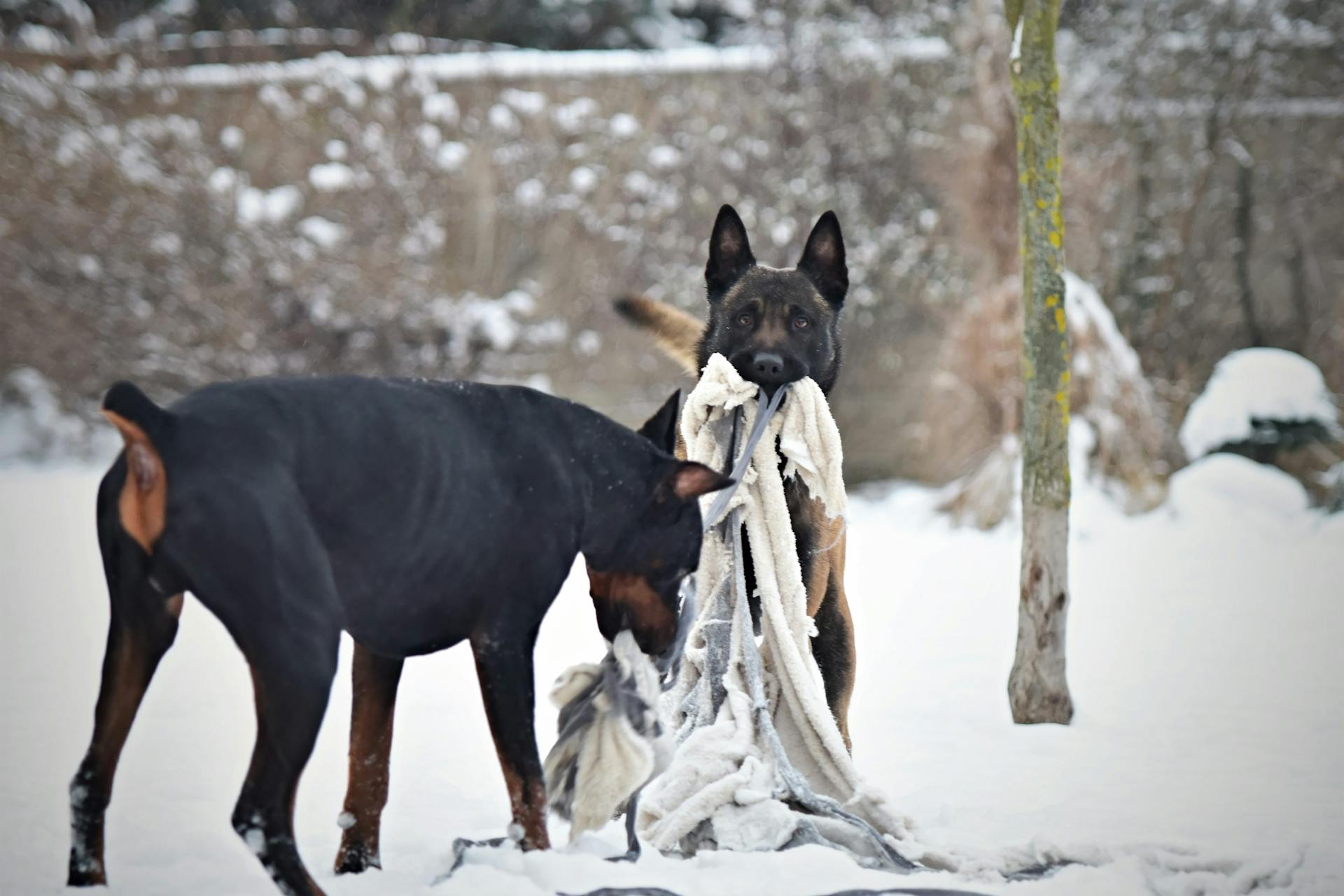
Kennel cough is a highly contagious respiratory disease that affects dogs of all ages and breeds. It's caused by a combination of bacteria and viruses, including Bordetella bronchiseptica and parainfluenza virus.
The symptoms of kennel cough can vary in severity and may include a persistent cough, runny nose, and loss of appetite. In severe cases, dogs may also experience difficulty breathing and pneumonia.
Kennel cough is highly contagious and can spread quickly in close living quarters, such as kennels, dog daycares, and even households with multiple dogs.
You might enjoy: How Long Kennel Cough Contagious after Antibiotics
Prevention and Treatment
Prevention and treatment are key to managing a kennel cough outbreak. Vaccination is the primary method for reducing the signs and symptoms, and includes immunization against agents such as Bordetella bronchiseptica, Canine influenza, and canine parainfluenza virus.
Your veterinary team will be able to advise you on the appropriate vaccination schedule. Minimizing exposure to crowded or poorly ventilated areas where the risk of infection is higher can also help prevent the spread of the disease.
A unique perspective: Kennel Cough Even with Vaccination
Regularly cleaning and disinfecting your dog's bedding, toys, and food and water bowls can also help prevent the spread of kennel cough. A healthy pet can fight off infections more effectively, so ensure your dog receives a balanced diet, regular exercise, proper veterinary care, and vaccinations.
To treat kennel cough, antibiotics may be prescribed to prevent secondary bacterial infections, as well as cough suppressant medication to ease the symptoms. Rest and supportive care are also essential, especially for mild cases.
In some cases, nebulizers and vaporizers utilizing inhaled antibiotics or bronchodilators may be beneficial, but are usually not prescribed. Using a dog harness rather than a dog collar to walk a dog with kennel cough can also help prevent irritation of the tracheal area.
Here are some general guidelines for treatment:
Your veterinarian may also recommend a kennel cough vaccination, especially if your dog is frequently boarded, visits dog daycare, or competes in canine sports. However, the bordetella vaccine on its own may not prevent your dog from catching kennel cough, as some cases are caused by other germs.
Causes and Transmission
Kennel cough is a highly contagious respiratory infection that can affect dogs of all ages, but it's especially concerning for puppies under 6 months old and dogs with compromised immune systems.
The bacterium Bordetella bronchiseptica is the primary cause of kennel cough, but it's not the only culprit - other pathogens like canine parainfluenza, canine respiratory coronavirus, and Streptococcus equi subspecies zooepidemicus can also contribute to the infection.
Dogs can contract kennel cough through airborne droplets, direct contact with other dogs, or by touching contaminated surfaces like food and water bowls. This makes places like boarding kennels, dog daycare facilities, and dog parks high-risk areas for transmission.
Take a look at this: Difference between Kennel Cough and Upper Respiratory Infection
Causes and Transmission
Kennel cough is caused by a variety of pathogens, including the Bordetella bacterium, which is the most common cause. This bacterium can be shed by dogs for several weeks after recovery, potentially making them carriers for a long time.
Respiratory infections involving Bordetella can be transmissible for several weeks longer than viral infections like canine parainfluenza or Canine respiratory coronavirus.
For more insights, see: Is Kennel Cough the Same as Bordetella

In fact, a recent report found that 45.6% of clinically healthy dogs have detectable levels of Bordetella in their nasal and pharyngeal areas, which expands the potential vector for transmission.
The highest levels of bacterial shedding occur one week post-exposure, with an order of magnitude decrease in shedding observed every week. This means that by six weeks post-exposure, shedding levels are negligible.
Other causes of upper respiratory tract infections in dogs include canine distemper virus, canine adenovirus type 2, canine influenza, and canine pneumovirus, among others.
Any dog exposed to one of these pathogens can be infected, but repeated exposure in a moist, warm environment with poor ventilation increases the likelihood of infection.
Dogs can spread kennel cough to one another through airborne droplets, direct contact, or contaminated surfaces, making places like dog daycare facilities, dog parks, and dog shows high-risk areas for transmission.
Curious to learn more? Check out: How Quickly Does Kennel Cough Show up
Breeds Prone to?
Dogs with short or flat noses, such as French Bulldogs, Pugs, and Boxers, are more prone to developing severe symptoms from kennel cough infections due to their anatomical makeup.
While any dog can contract kennel cough, these breeds are at a higher risk of developing clinical signs.
Canine influenza, also known as the dog flu, has emerged as another viral component of kennel cough, and it's spread easily among dogs through respiratory secretions and contaminated objects.
Dogs with short or flat noses may be more susceptible to the symptoms of canine influenza, which include coughing, sneezing, nasal discharge, and lethargy.
The H3N8 and H3N2 strains of canine influenza have specific vaccines available, which can be beneficial for dogs with regular contact with other dogs.
Suggestion: Kennel Cough vs Canine Influenza
Symptoms and Diagnosis
Symptoms of kennel cough can vary, but the most obvious symptom is a strong cough, often with a "honking" sound. Kennel cough is easily treatable in healthy dogs, but it's essential to report any coughing symptom to your veterinarian because it could be a sign of a more serious disease.
The incubation period for kennel cough is typically 5-7 days, but it can range from 3-10 days. The symptoms can include a harsh, dry cough, retching, sneezing, snorting, gagging, or vomiting in response to light pressing of the trachea or after excitement or exercise.
Here are some common symptoms of kennel cough:
- A cough (especially when pressure is applied to the trachea or windpipe)
- Sneezing
- Eye discharge
- Fever
- Trouble breathing
- Loss of appetite
- Lethargy
In severe cases, kennel cough can lead to pneumonia, so it's crucial to have your dog checked by a veterinarian if you suspect they have kennel cough.
Canine Infectious Respiratory Disease
Upper respiratory tract infections in dogs can be caused by a variety of pathogens, including Bordetella, parainfluenza, and canine distemper virus.
Any dog exposed to one of these pathogens can be infected, but a dog is more likely to be infected in a moist, warm environment with poor ventilation.
In kennels or shelters, infectious coughs can spread quickly and easily, often requiring quarantine of a whole section.
Even a simple exposure at a dog park can transmit the infection.
Most veterinarians can diagnose canine infectious respiratory disease based on clinical signs alone.
However, chest X-rays might be taken to rule out pneumonia, which would change the treatment.
A culture can be taken of the dog's upper airway to figure out what the underlying cause is, but this typically requires sedation and only covers bacteria.
A swab of the dog's nose and deep throat can be sent out for PCR tests to look for genetic material of the underlying cause, which can test for everything and doesn't require sedation.
A unique perspective: Infectious Tracheobronchitis in Dogs
What Are the Symptoms of?

If your dog has kennel cough, you may notice a strong cough with a "honking" sound, which is the most obvious symptom. This cough can be dry and hacking, or it could sound like your dog is retching.
Runny nose, sneezing, and eye discharge are also common symptoms of kennel cough. You may also notice lethargy, loss of appetite, and a low fever in your dog.
In more severe cases, kennel cough can cause a fever and trouble breathing. If your dog is unvaccinated, has a weak immune system, or has other illnesses, they may be more likely to experience these severe symptoms.
Here are some common symptoms of kennel cough:
- Strong cough with a "honking" sound
- Runny nose
- Sneezing
- Lethargy
- Loss of appetite
- Low fever
- Fever and trouble breathing in severe cases
Frequently Asked Questions
What is the new strain of kennel cough?
The new strain of kennel cough is caused by the H3N8 subtype of the influenza A virus. This strain was identified through a collaborative study with the University of Florida and Cornell University.
What is the fastest way to cure kennel cough?
Kennel cough recovery typically takes 1-3 weeks, but rest, hydration, and a nutritious diet can help speed up the process. Proper care can significantly reduce the duration of kennel cough in dogs.
Sources
- https://www.cityvet.com/understanding-kennel-cough-in-dogs-signs-prevention-and-treatment/
- https://www.akc.org/expert-advice/health/kennel-cough-in-dogs/
- https://www.americanhumane.org/fact-sheet/kennel-cough/
- https://en.wikipedia.org/wiki/Kennel_cough
- https://resources.bestfriends.org/article/kennel-cough-dogs-symptoms-treatments-vaccine
Featured Images: pexels.com


